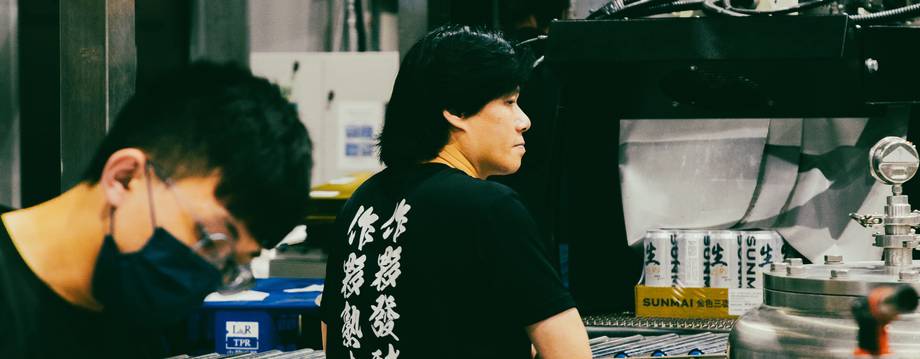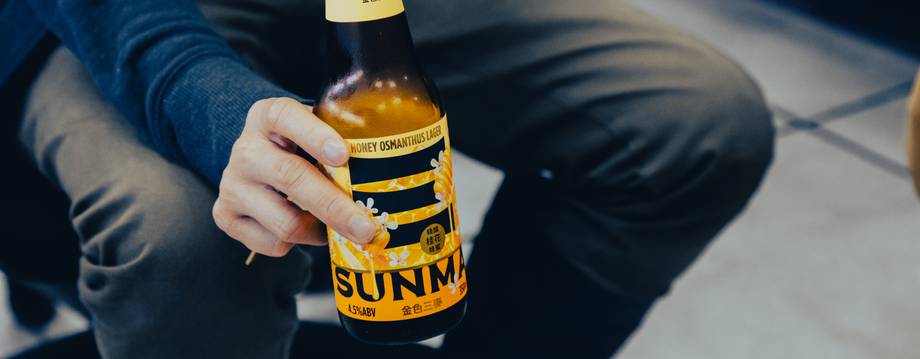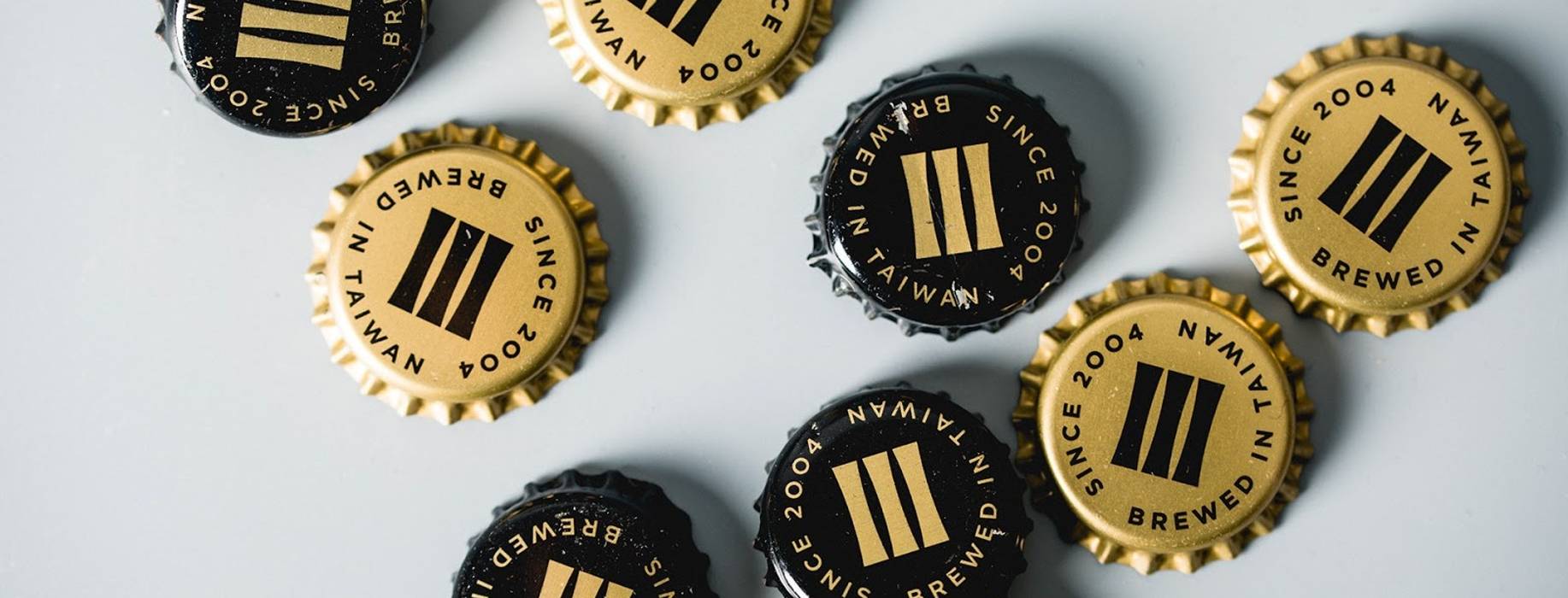A taste of honey
We speak to Sunmai’s head brewer Marcie Chan about the joy of using flavours from all corners of the island to produce distinctly Taiwanese craft beer
Robyn Gilmour
Photos:
Doug Wilson Garry
Saturday 31 May 2025

This article is from
Taiwan
issue 118
Share this article
Sunmai is a much more far-reaching operation than your average grassroots brewery. This brand is just one of many branches on the Le Ble D’Or tree, a brewery that grew into a much bigger operation, producing a range of beverages primarily for its estate of fifteen restaurants. When husband and wife Michael and Rico Yeh founded Le Ble D’Or in 2004, they did so with hospitality in mind. Michael was semi-retired and living in Canada when he learned of a friend seeking investment for a brewery. He chipped in, without any intention of getting involved in running the business. He loved beer, and with Taiwan having recently joined the WTO, he thought it was a great opportunity.
Michael and Rico had a rich and well-rounded life in Canada, with lots of friends that they developed a tradition of celebrating holidays with. Halloween, Thanksgiving, Christmas, you name it, they were hosting dinner. So when Michael returned to Taiwan to see the brewery he had invested in struggling, he decided to take it over, and run it himself. Under his influence, hospitality became an important part of operations, and over time, he built restaurants, a kombucha brewery, Ready-to-Drink cocktails and a distribution network into the Le Ble D’Or portfolio.
Where Le Ble D’Or was founded in 2004, Sunmai was born in 2016, a beer brand brought to life by Director of Operations Marcie Chan. According to Doug Pierce at Redpoint Brewing Co, “Marcie is the best. She’s one of my favourite people in the whole world”. High praise, but upon meeting Marcie, it’s easy to see how one would arrive at that conclusion. Soft spoken and gentle, but obviously ridiculously smart, Marcie manages beer production while also overseeing Le Ble D’Or’s wine making program — which uses imperfect, locally grown fruit to make wine — and kombucha brewery.

Until recently, beer and kombucha operated across separate kits in the same building, with kombucha production relocating to an operating partner's nearby site not long before our visit in early March, 2025. Few would dare to invite such different yeast cultures into the same building, increasing the risk of cross contamination, but as a microbiologist by training, Marcie has a firm grasp on the scrupulous levels of cleanliness required to maintain the divide. Everything in the brewery is constantly being sterilised anyway, but she’s relieved to be free of the risk such close quarters posed.
Fundamental to Marcie’s style of brewing is the flavour of local ingredients. Tea, in particular, became a beverage of interest for Marcie because it’s already so widely consumed in Taiwan. “People love bubble tea here”, she begins. “That isn’t just milk tea but also fruit tea, and both have different flavours of bubbles at the bottom. It has made people interested in trying new things.” While bubble tea has created a culture of open-mindedness among drinkers, more traditional tea drinkers have an appreciation for the often complex character of Taiwanese tea. With the local palate being already acutely attuned to these flavours, and accustomed to interpreting the complex character of a beverage, Marcie saw tea as a useful tool to introduce people to beer.
Taking us around the brewery, Marcie lets us taste several beers straight from the tank. Each is so exquisitely delicate that they might best be enjoyed like a wine or speciality tea; they’re light and floral, and reveal a complexity to anyone willing to consider it. Among several other ingredients which commonly appear in Sunmai’s beers, and which have been intentionally chosen to transport drinkers to different corners of Taiwan, is honey. Sunmai’s best known beer is a honey lager, made with the addition of golden honey to the boil, and by allowing the beer to undergo a secondary fermentation. The resulting beer is pale and bright but soft on the palate and awash with perceived sweetness. With all sugar from the honey fully fermented, only a subtle flavour and bold, fragrant aroma remains.

Marcie says that when Sunmai’s owner started the brewery, he and the company’s first head brewer now chairman, Quentin Yeh, mainly brewed dark lager, Hefweizen, and kellerbier using barley, wheat and rye; the “three golden malts” that give Le Ble D’Or its name. However, over time, Michael Yeh unearthed a fourth golden ingredient. As the owner of a then still small business, he met a bee farmer struggling to sell honey. Seeing an opportunity for both businesses to work together, Quentin designed a recipe for honey lager. Le Ble D’Or has been brewing this beer for the 16 years that have passed since.
Marcie is lucky to have inherited the recipe, and now be responsible for producing it, but so too is Sunmai lucky to have her on its team. It’s evident that she has a fiercely creative and experimental side, and is committed to incorporating Taiwanese flavours and local fermentation practices into beer production wherever possible. A fermentation enthusiast inside and outside of work, she tells me about a special sticky rice wine she was recently working on. For this, Marcie made a koji-style culture infused with local herbs, which she then used to inoculate sticky rice, the base of her grain bill. The finished product was a Taiwanese interpretation of sake.
One has to consider the wellspring of local flavours and fermentation practices from which brewing can draw inspiration, to begin understanding Taiwanese craft beer. Beer is just one of countless fermented alcoholic and non-alcoholic beverages that consumers enjoy in Taiwan, and so what craft producers here seem to be vying for, more than convincing drinkers to enjoy an Americanised or Eurocentric version of beer, is to brew something new. Hops, malt, water and yeast are just the foundations upon which a distinctively Taiwanese beer culture is very slowly being built. What could be more “craft” than that?
Share this article

